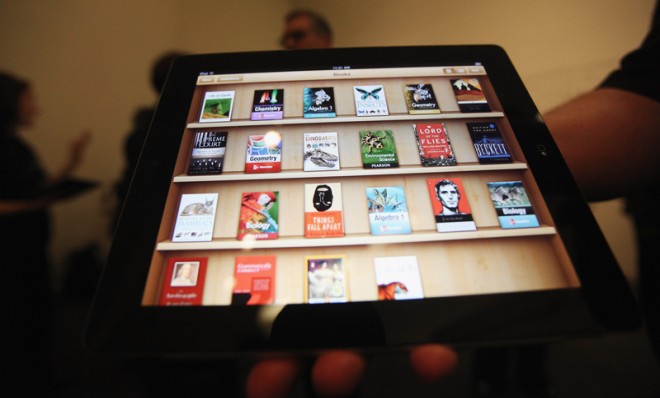Uncle Sam's case against Apple: What we know so far
Apple is accused of conspiring with publishers to illegally boost the price of e-books. The publishers have settled. Apple is not backing down.

A free daily email with the biggest news stories of the day – and the best features from TheWeek.com
You are now subscribed
Your newsletter sign-up was successful
In federal court in Manhattan this week, the United States Justice Department began trying to prove that Apple conspired with five publishers to illegally boost the price of e-books in the lead-up to the 2010 launch of the iPad, costing the American consumer hundreds of millions of dollars.
Apple claims it did nothing wrong, and was simply trying to increase competition in the e-book market. The five publishers — Macmillan, Penguin, Hachette, HarperCollins, and Simon & Schuster — all settled out of court. But Apple is taking "a very principled position on this," said CEO Tim Cook. "We're not going to sign something that says we did something we didn't do. And so we're going to fight."
Already, "Apple's stubborn defense is attracting great interest, offering a rare glimpse into the inner workings of the nation's tech giants whose innovations have roiled the media and entertainment landscape," says the Washington Post.
The Week
Escape your echo chamber. Get the facts behind the news, plus analysis from multiple perspectives.

Sign up for The Week's Free Newsletters
From our morning news briefing to a weekly Good News Newsletter, get the best of The Week delivered directly to your inbox.
From our morning news briefing to a weekly Good News Newsletter, get the best of The Week delivered directly to your inbox.
A run-down of the case's history, the DoJ's early evidence, and what we know so far:
Why was the price of e-books so low to begin with?
Amazon released the Kindle in 2007, and bought e-book titles from publishers using a "wholesale model," in which Amazon pays the distributor a set price for books, but then has control over the price the e-tail giant offers consumers. Amazon chose the low price of $9.99, compared to $25 to $35 for hardcovers and $16 to $21 for paperbacks.
How did Apple try to boost prices?
A free daily email with the biggest news stories of the day – and the best features from TheWeek.com
It used two methods. First, it urged publishers to switch from the wholesale model to an "agency model," in which the publisher would set the retail price and Apple, acting as the "agent," would take 30 percent commission.
Second, Apple struck a "most favored nation" contract with the publishers, which prevented Amazon and other retailers from selling the books at a lower price than Apple's. If Apple set an e-book price at $14.99, Amazon and Barnes & Noble would have to as well.
Did the plan work?
According to the government, it did. After signing with Apple, the publishers took the new plan to Amazon, demanding that Jeff Bezos' company switch to the agency model or stop selling their titles. After some initial resistance, Amazon agreed.
"Millions of e-books that would have sold at retail for $9.99 or for other low prices instead sold for the prices indicated by the price schedules included in the Apple Agency Agreements — generally, $12.99 or $14.99," the government said in the suit.
The settlement the five publishers signed with the feds required them to end their "most favored nation" contract with Apple, and let retailers like Amazon offer books at a discount.
Was Steve Jobs involved in this?
Yes. The DOJ called Jobs the "chief ringleader" of the conspiracy. In court on Monday, the feds displayed emails between Jobs and James Murdoch, an exec at News Corp, which owns HarperCollins.
"Heck, Amazon is selling these books at $9.99, and who knows maybe they are right and we will fail even at $12.99," Jobs wrote to Murdoch. "But we're willing to try at the prices we proposed. We are not willing to try at higher prices, because we are pretty sure we'll all fail."
"Throw in with Apple and see if we can all make a go of this to create a real mainstream e-books market at $12.99 and $14.99," Jobs wrote.
Prosecutors are also pointing to an excerpt in Walter Isaacson's biography in which Steve Jobs is quoted as saying, "We told the publishers, 'We'll go to the agency model, where you set the price and we get our 30 percent, and yes, the customer pays a little more, but that's what you want anyway.'"
For more on the feds' case, including emails from Jobs and publishing execs, check out this slideshow:
How is Apple defending Jobs?
Apple's lawyers called foul this week, saying the prosecution cherry-picked examples to support its argument, and that Jobs is not around to put his words into context.
Plus, Orin Snyder, Apple's lawyer said, Steve Jobs was too smart to make such an obvious mistake.
"To believe that [Jobs's] statements are direct, unambiguous evidence, admissions of a conspiracy, you have to credit the notion that he, in full public view and to his authorized biographer [whose book] he knew would be read by millions of people, made statements that can be interpreted in no other way than as unambiguous admissions of the price-fixing conspiracy charged in this case," he said.
Stay tuned for more fireworks and revelations. This trial is far from over.
Carmel Lobello is the business editor at TheWeek.com. Previously, she was an editor at DeathandTaxesMag.com.